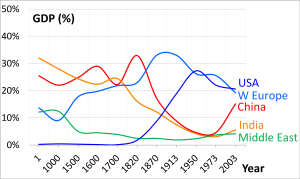In the millennia-old history of India, there have been several kingdoms which have existed and thrived in this land. This natural, organic history was disrupted by the bumbling administrators of the British Empire when India became a colonial outpost in the eighteenth century. The colonialists consolidated the entire region, including Burma, under one rule. It is a wonder of modern communications and coordination that with around one thousand bureaucrats, they were able to rule the entire land with the help of mostly cooperative natives.

Shift of wealth from east to west in around 300 years
In hindsight, it seems obvious why the consolidation happened. They were trying to minimize administrative expense while maximizing the profits squeezed out of the native population. They did this with brutal efficiency as India went from one of the richest lands to one of the poorest in a matter of around 300 years as seen in the above picture.
Legacy of colonialism
Fighting two World Wars drained the coffers of the empire on which “the sun never set”. Now they had no choice but to leave the administration to the natives. For this, the drama of propping up a half-naked fakir as a “father of the nation” was overseen by the departing colonialists.
Another legacy left behind was a class of native intellectuals who were steeped in the Fabian mores of the day. These intellectuals formed part of the ruling class for several decades after independence. They were responsible for the stagnant rate of growth of the economy because of the imposed socialism. Also, talented and creative youth were perverted by leftist propaganda to become hostile to both economic freedom and the ancient Hindu tradition.
Today, the nation stands to somewhat recoup its position in the world thanks to the liberalization of the economy since the 1990s. However, the people continue to suffer because of a corrupt centralized government structure preventing ordinary people from pursuing their economic well being. The recent exercise of demonitisation left the population scarred because of centralized government meddling in the currency. Excessive government meddling in human society produces a huge class of chronically dependent people. This has been seen in every socialist society. In contrast, in all societies where the forces of free market capitalism were left unfettered, such societies have exploded in prosperity for all. One just needs to compare Switzerland to socialist Venezuela (where people have recently resorted to eating stray dogs because they lack food).
Local control is most democratic
The case of Switzerland is all the more interesting because their model is one of a confederation of Cantons under the rule of a federal government. The Swiss model has ensured that the people of the Cantons have full control over how their tax money is spent by the local government. The federal government has some minimal functions such as foreign relations, defense etc. There is a healthy level of respect for the self-determination of the local governments. This ensures that the tax money given by the citizens is spent wisely at a local level under the control of the citizens themselves.
The function of any democratic government is to collect taxes and wisely spend it under full control of the population. The problem with the Indian government of today is it is very big and does too many things. Once tax money has been extracted from the people, the people have little control over where it is going to be spent. In reality, the political and administrative class of India do not behave as public servants, but as little dictators. Corruption is common as a result.
Government in accordance with dharma
The systematic theft of public wealth by the political class is a legacy of socialism and is in direct contradiction to dharma. In the ancient Indian tradition, kings were seen as servants of the people. Their responsibility was to ensure that taxes get spent wisely for the welfare of citizens. The colonial legacy of socialism and the gradual erosion of Hinduism in the political class has damaged the society.
In a democracy, it is the responsibility of the people to ensure that their tax money is being spend in accordance with dharma. Such a thing is only possible with more local control over the government with the local governments having more authority in terms of what gets spent where. This implies a decentralised government with more power in the hands of the local bodies to ensure an efficient allocation of resources with minimal central oversight.
The central government should focus solely on a minimal set of tasks, including foreign relations, defense etc, for which the resources can be allocated by each of the local bodies. This kind of decentralised structure will ensure that the central government cannot impose insane policies on the population. Also, this will reduce the need for a large number of central government entities, thus freeing up tax money to be spent in accordance with dharma by local bodies controlled by the local populace.


